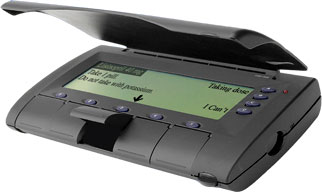
According to the Washington Business Journal, InforMedix has raised $1.5 million since last fall, in a story of entrepreneurial perseverance.
funding while working to boost its revenue this year, has launched two
private placement rounds since October. In its first, which closed in
February, it raised $865,000, more than its $500,000 minimum
requirement at the time, but falling short of its $2.5 million
potential max.
In late March, the company followed up with another private
placement round -- its sixth since forming through a reverse merger in
2003. This time, InforMedix has set its sights on the full $2 million
by mid-June to last it through the fall of 2008. So far, it's raised
$600,000 of that amount.
The company's fundraising struggles represent the day-to-day trials
of many young biotech and medical device companies to keep their
science on the lab tables. In InforMedix's case, it has a product on
the market, and says it has reached a turning point with two new sales
partnerships that it hopes will raise revenue and buoy operations.
"We could have had financing much earlier if we went with
convertible debt," says Bruce Kehr, a neuropsychiatrist who invented
the technology and founded InforMedix and now serves as its chairman
and CEO.
Instead, he says, InforMedix has opted for private investors over
hedge funds and their often-unforgiving control over the company.
"If you're in the medical device and life sciences business, you
never know when those key milestones are going to be hit," he says.
Private placement "doesn't carry that onus that if we hiccup we're
dead."
Like many startups in the remote monitoring/chronic disease management market, InforMedix has struggled with market timing and reimbursement.
Rather than hiccuping, InforMedix may be getting its second wind.
Last year, its Med-eMonitor System, an electronic pillbox that reminds
patients to take their meds and detects when they don't, brought in
about $103,000 in sales -- nearly five times the previous year's sales.
With seven full-time employees, InforMedix has recently stepped up
efforts to pump that increase up even more, inking four partner deals
to market or expand its monitoring device in the last six months,
including with ADT WellHealth, a division of the security company, and
XL Health, a company backed by Goldman Sachs.
"We really believe we've hit a very exciting inflection point,"
Kehr says. "ADT did 20 months of due diligence with us before they
signed the deal."
InforMedix also has nabbed six university and health care company
customers for studies, pilots or rollouts from San Francisco to San
Antonio, Montana to Pennsylvania. In March, InforMedix hired Richard
Voss, its new senior vice president of business development, marketing
and sales, and a former perennial product launcher for a division of
Abbott Laboratories.
InforMedix ended last year with a capital deficit of $1.9 million
but has kept the lights on through the $36.8 million it raised in two
years through equity sales to its founders, investors and private
lenders, and, often, in return for manufacturing services.
The company has borrowed nearly $800,000 from its CEO and board members, and at times paid its management team in shares.
I saw their system at last summer's Healthcare Unbound conference, and it looked like a great system. Pictured right is the InforMedix Med-eMonitor, which combined with their software, comprises their medication adherence solution.


Recent Comments